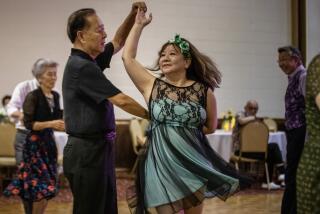He was the life of the dance floor, until coronavirus took him down
Scott Blanks seemed to be able to tackle anything in life with good humor. More often than not, he put his worries on the back burner and focused instead on the good things in life, dancing many nights away with a seemingly endless circle of friends.
But on March 18, Blanks let out a rare cry for support. After experiencing flu-like symptoms for two weeks, he had gone to the emergency room that week — for the second time — with a feeling that he couldn’t breathe. From the hospital, the morning before he would be placed on a ventilator, he posted on Facebook: “These [past] two weeks I wouldn’t wish on my worst enemy! Keep me in your prayers please! It’s already been a really bumpy ride!”
Blanks, a 34-year-old dental assistant from Whittier, died on March 27 from COVID-19.
Blanks had asthma as a child but didn’t exhibit symptoms or require treatment as an adult, according to his family. His death highlights what is becoming increasingly common as we learn about the novel coronavirus: It is affecting people of all ages, including those who appeared healthy.
“We were shocked and kind of feeling numb, because it didn’t feel real,” said Karen Blanks, Scott Blanks’ sister-in-law. “We couldn’t even go see him or be with him.”
Karen Blanks said her brother-in-law had been to the emergency room before, on March 13, and was told to go home, take over-the-counter medication and return if his symptoms worsened. He went to the hospital again March 15 and was tested for the virus. Friends and family think he could have been exposed either at work or during his most recent trip to Palm Springs. When the test results came back about a week later, he was still hospitalized and on a ventilator.
It was a different image than his friends and family were used to when they thought of Blanks.
Several groups of researchers are testing different methods to divert critically ill COVID-19 patients from needing ventilators in the first place.
When Jessie Funes-Macdonald got into her car and turned on dance music, she began crying. She thought of Blanks, and the times they had gone dancing at West Hollywood clubs as Pasadena City College students.
He was a good dancer. He loved to sing, and he especially loved Beyoncé, Funes-Macdonald said.
At PCC, Blanks was involved in academic fraternities, leadership groups and LGBTQ clubs. He studied accounting, worked at Starbucks for several years and later decided to study to become a dental assistant. Throughout the stages of his life, he had an ability to not only keep in touch with dozens of people, but to make each of them feel special, friends said.
On social media, those friends shared memories and old photographs with a goofy, always smiling Blanks.
“There wasn’t a time I interacted with Scott where he wasn’t cracking a joke or saying something positive,” Funes-Macdonald said.
Vincent Estrada last saw Blanks in December at Estrada’s wedding. Despite being a stranger to most at the party, Blanks won everyone’s hearts.
He danced to the Spanish music and even learned the “Caballo Dorado” line dance, common at Latino parties.
“And he was doing it probably better than anybody else,” Estrada said.
Estrada credited Blanks with lifting him up in dark times and seeing him through life changes, from being jobless and struggling with his identity as a gay man to starting a new career as a sheriff’s deputy and getting married.
“It was very difficult for me to accept myself, and he made me feel proud about myself,” Estrada said. “He lent me his strength, his humor and his sincerity. I don’t think I would have been able to get here without his inspiration.”
Estrada said he recalls only one time that Blanks expressed a personal struggle. A few years ago, he lamented not being exactly where he wanted to be in life as he entered his 30s. But he took it in stride and savored each moment.
“I think that’s one thing he did do,” Funes-Macdonald said. “He did live his life to the fullest every single day.”
His friends and family expressed anger and frustration toward leaders for not warning people sooner about the coronavirus threat. Had they done so, it could have given Blanks and others a better chance of survival, Funes-Macdonald said.
“Right now we’re not only scared in this world, but we also have a lot of anger in us,” Estrada said. “I think it’s important we realize that anger is a heavy load to carry. It’s a lot easier to just let it go and to hold on to your sense of humor. That’s one of the things Scott taught me.”
More to Read
Sign up for Essential California
The most important California stories and recommendations in your inbox every morning.
You may occasionally receive promotional content from the Los Angeles Times.











